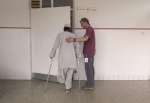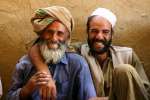For refugees in Iran, health plan brings care and comfort
News Stories, 17 December 2015
TEHRAN, Islamic Republic of Iran, Dec 17 (UNHCR) -- As an Afghan refugee and an only son, Ajab Khan Yaghoubi's entire family relies on him to survive. But the 22-year-old suffers from hemophilia, a genetic illness which until recently left him with painful bleeding, expensive medical bills and an uncertain future.
Now, thanks to an unprecedented initiative from the Government of the Islamic Republic of Iran that was announced last month and will eventually bring nearly a million refugees within the national healthcare safety net, he can once again live life to the full.
Ajab is part of the second generation of Afghan refugees whose parents fled to neighbouring Iran following the Soviet invasion in 1979. He and his four sisters were born and raised in the Saveh settlement, 165 kilometres southwest of Tehran, where they still live today.
With hemophilia affecting many in Ajab's family, heavy medical expenses made life in exile harder than ever. "I felt hopeless," Ajab recalls, teary-eyed. "I always wanted to contribute to the society that I am living in and to the livelihood of my family. Every time I wanted to get my medication, I had to see if I could borrow money from friends and relatives."
It was the Universal Public Health Insurance (UPHI) scheme, also known as Salamat Health Insurance, that eventually came to Ajab's aid. The largescale initiative is based on an agreement between UNHCR, the Bureau for Aliens and Foreign Immigrants Affairs (BAFIA) of the Ministry of Interior, the Ministry of Health, and the Iran Health Insurance Organisation (Salamat).
Through it, refugees can benefit from a health insurance package for hospitalization, similar to that of Iranian nationals. It was hailed on its launch by the UN's High Commissioner for Refugees, António Guterres as "unprecedented." He said he hoped other countries would follow Iran's "exemplary initiative which is going to profoundly impact the lives of its refugees."
Just three weeks after Ajab obtained his Salamat insurance booklet, he had already obtained the first batch of his medication. "I no longer have to worry about the repeated painful bleeding in my hands and legs," he says. "I am relieved that I now have affordable access to health assistance." He has also found the peace of mind to think about his future and is making plans to open a grocery store in the settlement with his family.
Access to Salamat Health Insurance stands to benefit nearly one million Afghan and Iraqi refugees living in Iran, and addresses the financial challenges related to the high cost of health care. Ensuring access to health care through the UPHI is life changing – improving the physical and mental health and the economic and social well-being of people like Ajab and his family.
Ajab's sister Nasibeh, whose three children all suffer from hemophilia, is particularly grateful. "At times, I had to prioritise between my children for their treatment," she says. "I would like to thank the Islamic Republic of Iran and UNHCR for bringing back peace of mind to our house. I ask that you never leave us on our own with this plight."
By Sharareh Jalali in Tehran, Islamic Republic of Iran




















































